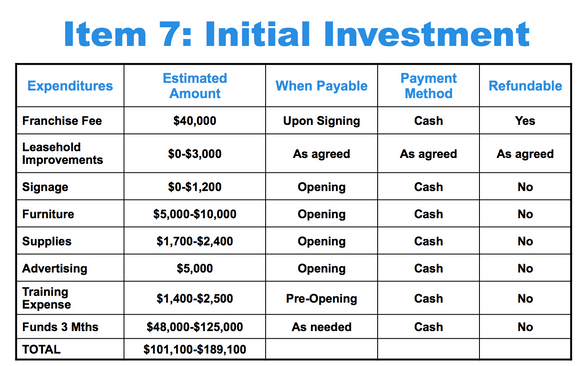How Much Will You Pay to Buy a Franchise?
The good news is that franchising probably isn’t as expensive as you’ve been told it is. People often say, “It takes a million bucks to buy a franchise,” but that’s many times richer than what it actually costs to buy many franchises.
Here’s better news: Franchisors will show you upfront how much you’ll pay to buy their franchise. In fact, in the United States, franchisors are required to reveal this information in Item 7 of the Franchise Disclosure Document (FDD), and you must have the FDD in your possession for at least 14 days prior to buying a franchise.
Take a look at the Item 7 graphic that follows. This is what you can expect to see in a FDD. You should expect franchisors that are not selling franchises in the USA to provide similar information, even if they’re not required to do so by law. Item 7 not only specifies the amount of money to be paid, but also explains when it’s payable, the payment method, and whether or not the money is refundable.
The Item 7 information below is real data from a service franchise as opposed to a retail franchise. This particular franchise operates from a small office instead of a retail outlet. The franchisee would provide a service in the real estate industry. Following is an explanation of the typical start up costs that you’d encounter if you bought this franchise.

Franchise Fee
Every franchisor requires an upfront franchisee fee. These fees range from a low of several thousand dollars to $50,000 or more. In the franchise represented above, the franchise fee is $40,000.
The franchise fee is almost always paid at the time of signing the franchise agreement and before the new franchisee receives any training, or learns any of the franchisor’s trade secrets. Generally the fee is refundable until the franchisee attends the franchisor’s training program.
Leasehold Improvements
In the case above, the franchisee needs an office, but the office could be in the franchisee’s home, and leasehold improvements might not be necessary. The franchisor and the franchisee would discuss the office requirements and determine if any improvements were necessary. Any money required would not be paid to the franchisor, but to the person providing leasehold improvements.
Signage
Sign companies love to say, “A business with no sign is a sign of no business.” However, the size of a franchisee’s sign, and the number of signs needed, may be minimal, especially with a service business. Signage is sometimes used in front of a building, or on the side of a vehicle. In this case, the franchisor estimates the franchisee will pay up to $1,200 for signage. Even though it’s not specified on the form, the signage money would be paid to the sign maker, and not the franchisor.
Furniture
Desks, tables, chairs, and even electronic equipment can be included here. It’s possible in a service business that you’d already have the furniture you need, but in cases where the franchisor wants all franchisees to use the same furniture, or equipment, there will be some costs. Again, these costs are generally not paid to the franchisor, but to the providers of the furniture and equipment.
Supplies
A service business needs little to no inventory or other materials that could be used in the start-up and ongoing operation of the business. In this case, the franchisor estimates the franchisee will pay $1,700 to $2,400 for supplies to begin the business. Once again, the money would be paid to the suppliers and not the franchisor, unless the franchisor provides some of the supplies.
Advertising
A major cost of every business start-up, including franchises, is advertising and marketing, including public relations. The advantage to franchisees is that they usually share the costs of advertising with other franchisees. In the franchise above, the franchisor requires a $5,000 advertising fee. This money could be paid to the franchisor, if the franchisor is providing the advertising, marketing, or public relations. Or the money may be paid directly to a media company or agency. Note that the money is due when the franchisee opens the business, and it’s not refundable.
Training Expense
Franchisees succeed in part because they are given an operating system, provided by the franchisor, and then training to explain how to follow the system to operate the business. Training is one of the most critical elements of a franchise business. Some training sessions last several days, while others, depending on the complexity of the business, require several weeks. Training fees are usually included in the franchise fee, but additional expenses, for travel to/from training, for lodging and meals, may be paid separately. In this case, the franchisor is providing two weeks of training and the additional costs will range from $1,400 to $2,500.
Funds 3 Months
Franchisors worry about their franchisees’ abilities to sustain themselves while getting the business off the ground. While some franchisees collect money from their first day in business, particularly when they sell a product or provide a service that’s immediately utilized, other franchisees continue to pay out money before they take in much money.
In the latter circumstances, how will the franchisee afford to live?
Can the franchisee pay his or her mortgage and any auto payments? How about buying food for the family, and clothing and school tuition? Medical bills? Old college debts?
Good franchisors review their franchisees’ living requirements prior to selling a franchise, and, depending on the circumstances, advise the franchisee appropriately.
If the new franchise business won’t generate funds that the franchisee can take home to spend during the first 90 days, the franchisor wants to be sure the franchisee can afford to live. In the example above, the franchisor estimates the new franchisee will need $48,000 to $125,000 to pay for living costs during the first three months. This is largely a guess on the franchisor’s part, and is often exaggerated just to be conservative. Of course, none of this money will be paid to the franchisor.
What’s the total investment?
All in, a new franchisee in the case above could expect to pay between $101,100 and $189,100, with most of the money earmarked for the franchisee’s living expenses for 90 days. Subtract the living expenses and the real cost of starting this service franchise is $53,100 to $64,100.
Keep in mind that startup costs vary widely. If you need to buy inventory you might add $35,000 to $65,000 to the initial costs. If you need to pay leasehold improvements for a new restaurant, or your franchise requires a large office with specific computer equipment, plus indoor and outdoor branding, you could add another $75,000 to $150,000 to your costs. It’s even more costly if you’re required to pay a long-term lease, or build a building.
Generally, you’ll pay less for franchises that you can operate from home, a small office, or a van, than you’ll pay for franchises that you must operate from the shopping mall, a strip center, or a stand-alone building.
But with nearly 3,000 different franchise brands in North America alone, representing more than 75 major industries, there’s a franchise opportunity for almost every budget. There are also lenders eager to help franchisees, and even the VetFran program to help U.S. veterans of the armed services buy franchises.
Yes, you can spend a million dollars to buy a franchise, but why would you? There are many that cost considerably less.

